| Listing 1 - 10 of 13 | << page >> |
Sort by
|
Book
ISBN: 1282396846 9786612396847 9047421825 9789047421825 9789004153431 9004153438 Year: 2007 Publisher: Leiden Boston Brill
Abstract | Keywords | Export | Availability | Bookmark
 Loading...
Loading...Choose an application
- Reference Manager
- EndNote
- RefWorks (Direct export to RefWorks)
Volume two of Theorizing Rituals mainly consists of an annotated bibliography of more than 400 items covering those books, edited volumes and essays that are considered most relevant for the field of ritual theory. Instead of proposing yet another theory of ritual, the bibliography is a comprehensive monument documenting four decades of theorizing rituals.
Book
ISBN: 8496373894 9788496373891 Year: 2007 Volume: 105 Publisher: [Huelva]: Universidad de Huelva,
Abstract | Keywords | Export | Availability | Bookmark
 Loading...
Loading...Choose an application
- Reference Manager
- EndNote
- RefWorks (Direct export to RefWorks)
Women --- History --- #SBIB:39A10 --- Antropologie: religie, riten, magie, hekserij --- Women - Spain - History --- Women - Latin America - History --- Espagne --- Saintes femmes --- Maria Deipara --- Rocío
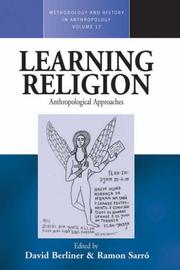
ISBN: 9781845453749 1845453743 Year: 2007 Volume: 17 Publisher: New York (N.Y.) : Berghahn books,
Abstract | Keywords | Export | Availability | Bookmark
 Loading...
Loading...Choose an application
- Reference Manager
- EndNote
- RefWorks (Direct export to RefWorks)
Ethnology --- Religion. --- Anthropologie sociale et culturelle --- Religion --- Religious aspects. --- Aspect religieux --- Religious aspects --- #SBIB:39A10 --- Antropologie: religie, riten, magie, hekserij --- Religion, Primitive --- Atheism --- God --- Irreligion --- Religions --- Theology --- Cosmologie --- Ethnology - Religious aspects

ISBN: 9781592214853 1592214851 9781592214846 1592214843 Year: 2007 Publisher: Trenton Africa World Press
Abstract | Keywords | Export | Availability | Bookmark
 Loading...
Loading...Choose an application
- Reference Manager
- EndNote
- RefWorks (Direct export to RefWorks)
#SBIB:39A10 --- #SBIB:39A73 --- Antropologie: religie, riten, magie, hekserij --- Etnografie: Afrika --- Witchcraft --- witchcraft --- Ghana --- Ghanaian witchcraft beliefs --- the Christian Church --- the Mbambi --- Batswana --- witch-hunting --- Zambia --- international illegal trade --- witchcraft practices --- the Abakwaya --- Tanzania --- witchcraft accusations --- South Africa
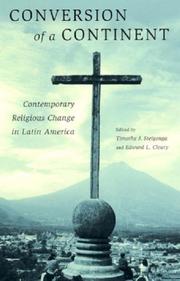
ISBN: 9780813544021 0813544025 0813542014 9780813542010 0813542022 9780813542027 1281316598 9781281316592 9786611316594 6611316590 Year: 2007 Publisher: New Brunswick, N.J. : Rutgers University Press,
Abstract | Keywords | Export | Availability | Bookmark
 Loading...
Loading...Choose an application
- Reference Manager
- EndNote
- RefWorks (Direct export to RefWorks)
A massive religious transformation has unfolded over the past forty years in Latin America and the Caribbean. In a region where the Catholic Church could once claim a near monopoly of adherents, religious pluralism has fundamentally altered the social and religious landscape. Conversion of a Continent brings together twelve original essays that document and explore competing explanations for how and why conversion has occurred. Contributors draw on various insights from social movement theory to religious studies to help outline its impact on national attitudes and activities, gender relations, identity politics, and reverse waves of missions from Latin America aimed at the American immigrant community. Unlike other studies on religious conversion, this volume pays close attention to who converts, under what circumstances, the meaning of conversion to the individual, and how the change affects converts' beliefs and actions. The thematic focus makes this volume important to students and scholars in both religious studies and Latin American studies.
Conversion --- #SBIB:316.331H382 --- #SBIB:39A10 --- #SBIB:39A74 --- Religious conversion --- Psychology, Religious --- Proselytizing --- Geografische spreiding van de godsdiensten: Amerika --- Antropologie: religie, riten, magie, hekserij --- Etnografie: Amerika --- Latin America --- Religion. --- Conversion.
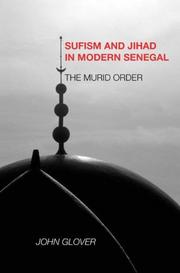
ISBN: 1580462685 9781580462686 9781580466998 1580466990 Year: 2007 Publisher: Suffolk Boydell & Brewer
Abstract | Keywords | Export | Availability | Bookmark
 Loading...
Loading...Choose an application
- Reference Manager
- EndNote
- RefWorks (Direct export to RefWorks)
The Murid order, founded in Senegal in the latter decades of the nineteenth century, grew into a major Sufi order during the colonial period and is now among the most recognizable of the Sufi orders in Africa. Murids have spread the voice of Islam and Africa in concert halls and on the airwaves through pop singers - especially Youssou N'Dour - and the image of Shaykh Amadu Bamba M'Backé, the founding saint of the order, often used to grace the covers of works concerning Islam, African culture, abolition, and European colonization. In this insightful and revealing study, John Glover explores the manner in which a Muslim society in West Africa actively created a conception of modernity that reflects its own historical awareness and identity. Drawing from Murid written and oral historical sources, Glover carefully considers how the Murid order at the collective and individual levels has navigated the intersection of two major historical forces - Islam, specifically in the contexts of reform and mysticism, and European colonization - and achieved in the process an understanding of modernity not as an unwilling witness but as an active participant. Ultimately, 'Sufism and Jihad in Modern Senegal' presents the reader with a new portrait of a society that has used its notion of modernity to adapt and incorporate further historical changes into its identity as an African Sufi order. John Glover is associate professor of history at the University of Redlands in southern California.
Islamic sects --- Murīdīyah --- #SBIB:316.331H421 --- #SBIB:39A10 --- #SBIB:39A73 --- Mouride Brotherhood --- Mourides --- Murīdiyya --- Murids --- Sufism --- Islam --- Muslim sects --- Sects, Islamic --- Sects, Muslim --- Sects --- Islamic heresies --- History --- Morfologie van de godsdiensten: Islam --- Antropologie: religie, riten, magie, hekserij --- Etnografie: Afrika --- Murid Sufi Order --- Murīdiyyah --- History. --- Islamic culture. --- Jihad. --- Modern Senegal. --- Murid Order. --- Sufism.
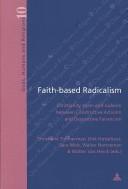

ISSN: 13778323 ISBN: 9780820466965 0820466964 9789052010502 9052010501 Year: 2007 Volume: 10 Publisher: Bruxelles Lang
Abstract | Keywords | Export | Availability | Bookmark
 Loading...
Loading...Choose an application
- Reference Manager
- EndNote
- RefWorks (Direct export to RefWorks)
In september 2005 organiseerde UCSIA een internationale zomercursus over Faith-based Radicalism: Christianity, Islam and Judaism between Constructive Activism and Destructive Fanaticism. UCSIA bundelde de belangrijkste bijdragen in deze Engelstalige academische publicatie. In het Westen wordt religieus radicalisme bijna onmiddellijk geassocieerd met islamextremisme: terroristische aanvallen op Westerse machtssymbolen, zelfmoordterroristen in het Midden-Oosten, Tsjetsjenië en Irak. Maar er zijn ook vele voorbeelden van christelijk en joods religieus radicalisme. Terwijl de dagelijkse mediaberichtgeving enkel aandacht heeft voor de spectaculaire en gewelddadige voorbeelden van religieus radicalisme, is het belangrijk te beseffen dat religie ook allerlei vormen van gemeenschapsopbouw en politieke hervormingen kan motiveren. UCSIA wenst met deze publicatie aandacht te besteden aan de ambigue relatie tussen geweld en religie. De thematiek wordt hier onderzocht in de specifieke Europese context. Het boek geeft een overzicht van de theologische en psychologische mechanismen aan het werk en van de sociale, politieke en economische motivering die religieus radicalisme kunnen verklaren.
Fondamentalisme religieux --- Fundamentalism [Religious ] --- Fundamentalisme [Godsdienstig ] --- Fundamentalisms [Religious ] --- Fundamentalist movements [Religious ] --- Fundamentalistische bewegingen (Godsdienst) --- Godsdienstig fundamentalisme --- Mouvements fondamentalistes (Religion) --- Religious fundamentalism --- Violence --- Religion and sociology --- Fondamentalisme --- Sociologie religieuse --- Congresses. --- Religious aspects --- Christianity --- Islam --- Judaism --- Congrès --- Aspect religieux --- Christianisme --- Judaïsme --- Abrahamic religions --- #SBIB:316.331H300 --- #SBIB:316.331H333 --- #SBIB:39A10 --- #GGSB: Godsdiensten (dogmatiek) --- Godsdienst en samenleving: algemeen --- Godsdienst, oorlog en vrede --- Antropologie: religie, riten, magie, hekserij --- Congrès --- Judaïsme --- Religions --- Sociology of religion --- Christian religion --- Social problems --- Jewish religion --- Godsdiensten (dogmatiek)
Book
ISBN: 9789044119671 Year: 2007 Publisher: Antwerpen : Garant,
Abstract | Keywords | Export | Availability | Bookmark
 Loading...
Loading...Choose an application
- Reference Manager
- EndNote
- RefWorks (Direct export to RefWorks)
De hoofddoek heeft nog veel meer betekenissen dan enkel de religieuze connotatie die nu het westerse hoofddoekendebat beheerst. De auteur toont in dit boek aan dat de hoofddoek en het haar complexe en veelzijdige symbolen zijn. Zij plaatst de betekenisveranderingen van hoofddoek en haar in een historisch en intercultureel perspectief, waarbij de seksuele betekenis één van de mogelijkheden is.
Hoofddoek --- 668.5 Migrantenvrouwen --- #SBIB:39A9 --- #SBIB:39A10 --- #SBIB:316.331H531 --- 315.1 --- rituelen --- godsdienst --- hoofddoeken --- 39 --- Hoofddoeken --- Migranten --- Antropologie --- Medische antropologie / gezondheid / handicaps --- Antropologie: religie, riten, magie, hekserij --- Godsdienstige praktijken: deelname volgens leeftijd en sociale categorieën --- Vrouwenemancipatie algemeen --- haar --- culturele antropologie --- Biological anthropology. Palaeoanthropology --- Sociology of the family. Sociology of sexuality --- seksualiteit --- Haar (vrouw) --- 308.1 --- Hair --- Social aspects --- Sex (Psychology) --- Addresses, essays, lectures --- Cultural aspects --- Vrouwenemancipatie ; algemeen --- Identity --- Islam --- Psychoanalysis --- Sexuality --- Appearance --- Female body --- Book --- Anthropology --- Veil
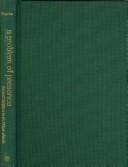
ISBN: 9786612358616 1282358618 0520940040 1433708302 9780520940048 9781429478083 142947808X 9781433708305 9781282358614 9780520249035 0520249038 9780520249042 0520249046 Year: 2007 Publisher: Berkeley University of California Press
Abstract | Keywords | Export | Availability | Bookmark
 Loading...
Loading...Choose an application
- Reference Manager
- EndNote
- RefWorks (Direct export to RefWorks)
The Friday Masowe apostolics of Zimbabwe refer to themselves as "the Christians who don't read the Bible." They claim they do not need the Bible because they receive the Word of God "live and direct" from the Holy Spirit. In this insightful and sensitive historical ethnography, Matthew Engelke documents how this rejection of scripture speaks to longstanding concerns within Christianity over mediation and authority. The Bible, of course, has been a key medium through which Christians have recognized God's presence. But the apostolics perceive scripture as an unnecessary, even dangerous, mediator. For them, the materiality of the Bible marks a distance from the divine and prohibits the realization of a live and direct faith. Situating the Masowe case within a broad comparative framework, Engelke shows how their rejection of textual authority poses a problem of presence-which is to say, how the religious subject defines, and claims to construct, a relationship with the spiritual world through the semiotic potentials of language, actions, and objects. Written in a lively and accessible style, A Problem of Presence makes important contributions to the anthropology of Christianity, the history of religions in Africa, semiotics, and material culture studies.
Masowe, Johane. --- Masowe weChishanu Church. --- Friday Masowe Church --- #SBIB:316.331H381 --- #SBIB:316.331H520 --- #SBIB:39A10 --- #SBIB:39A73 --- Geografische spreiding van de godsdiensten: Afrika --- Geloofsopvattingen, houdingen en religieuze cultuur: algemeen --- Antropologie: religie, riten, magie, hekserij --- Etnografie: Afrika --- Religion. --- Religion, Primitive --- Atheism --- Irreligion --- Religions --- Theology --- africa. --- anthropologists. --- apostolics. --- bible. --- christianity. --- church history. --- comparative religion. --- demographic studies. --- divine union. --- ethnographers. --- faith and spirituality. --- friday masowe. --- global christians. --- gods presence. --- historical ethnography. --- holy spirit. --- mediation. --- nonfiction. --- personal authority. --- religious anthropology. --- religious authority. --- religious faith. --- religious practices. --- religious scholars. --- religious studies. --- scriptures. --- semiotics. --- spiritual world. --- world religions. --- zimbabwe.
Book
ISBN: 9789058676276 9058676277 Year: 2007 Volume: 31 Publisher: Leuven Universitaire Pers
Abstract | Keywords | Export | Availability | Bookmark
 Loading...
Loading...Choose an application
- Reference Manager
- EndNote
- RefWorks (Direct export to RefWorks)
De vraagstelling van 'Dood & begrafenis' gaat uit van het fenomeen dat, in het vooruitzicht van het levenseinde, bij de dood zelf, onmiddellijk daarop volgend en later; een serie van traditionele rituelen, gebruiken en verhalen de overweldigende ervaring van het sterven in kaart poogt te brengen, te ordenen, te beheersen, kortom er mee om te gaan op een menselijke wijze. De bundel benadert het fenomeen vanuit drie fasen. "Met de dood voor ogen" gaat na hoe we aankijken tegen de dood, welke voorstellingen we hebben van het sterven. "Rituelen en zinsduidingen bij de dood zelf" onderzoekt de omgang met het dode lichaam: welke rituelen worden aangewend, onder meer in het perspectief van een verrijzingsgeloof. "Rouwen en herinneren" ten slotte bekijkt de verwerking van het afscheid van de overledene in het rouwproces en de herinnering. Binnen deze driedelige structuur werpen 11 academici vanuit hun discipline en specialisme licht op deze fenomenen
dood --- begrafenis --- Funeral rites and ceremonies --- Death --- Burial --- Burial. --- Death. --- Funeral rites and ceremonies. --- rituelen --- Liturgy --- Physiology: reproduction & development. Ages of life --- Folklore --- katholicisme --- begrafenissen --- rouwverwerking --- Philosophy and psychology of culture --- Christian pastoral theology --- Religious studies --- Mourning customs --- Flanders (Belgium) --- 393 --- 291.37 --- Academic collection --- #gsdb6 --- #GGSB: Rituelen --- #SBIB:316.331H521 --- C1 --- 906.1 --- godsdienst --- rouw (verdriet) --- zingeving --- 393 Dood. Dodengebruiken. Dodenritueel. Lijkverbranding. Begrafenis. Crematie. Rouw. Opbaren. Lijkstoet. Sterven. Dodenmaskers --- Dood. Dodengebruiken. Dodenritueel. Lijkverbranding. Begrafenis. Crematie. Rouw. Opbaren. Lijkstoet. Sterven. Dodenmaskers --- Godsdienstige ceremonieën. Religieuze symboliek. Mysteries. Inwijding --- Riten, liturgie, devoties, sacramenten --- Kerken en religie --- (zie ook: rouw) --- (zie ook: dood) --- Social sciences Death customs --- Dood --- Christendom --- Rouwen --- Begrafenissen --- Verliesverwerking --- 393 Death. Treatment of corpses. Funerals. Death rites --- Death. Treatment of corpses. Funerals. Death rites --- Begrafenis --- Ethiek --- Kunst --- Symboliek --- Godsdienst --- Sport --- Duurzaamheid --- Filosofie --- Psychologie --- Sociologie --- Autisme --- Cultuur --- Kind --- Samenleving --- Technologie --- Wetenschap --- Historische kritiek --- Man --- Erfelijkheidsleer --- Stadssamenleving --- Voeding --- Maatschappij --- Verpleegkunde --- Drank --- Gezondheid --- Volwassene --- Geschiedenis --- Voorlichting --- Rituelen --- rooms-katholieke kerk
| Listing 1 - 10 of 13 | << page >> |
Sort by
|

 Search
Search Feedback
Feedback About UniCat
About UniCat  Help
Help News
News